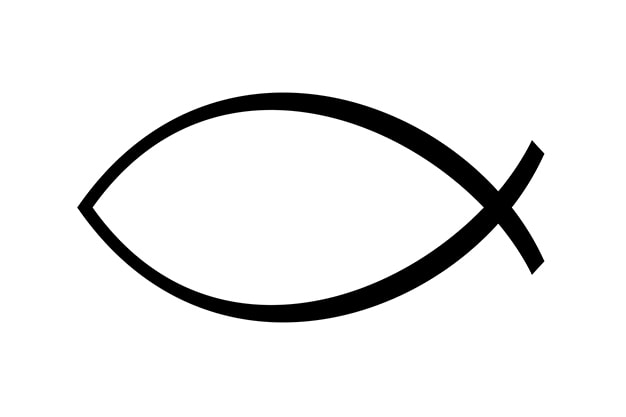
This article evaluates the fish symbolism particularly in Christendom. The symbol is basically depicted by two intersecting arcs. At the right point of connection, the arcs go a little further than the meeting point. The whole arrangement appears like a fish.
Origins
The symbol, though originally and extensively used by many pagan communities like the Greeks and Romans, it has become part and parcel of the rich array of Christian symbols in use today. Tertullian, in his discourse On Baptism, makes the observation that believers are little fishes born in water after the example of Jesus Christ. Subtly, the expression refers to Jesus as a Fish. In the ancient beliefs of the pagans, the fish symbol was known to have been a symbol of the sea goddess Atargatis. As an offspring of the sea goddess, various names were used to describe the fish symbol. Chief among them were Delphine, Tirgata, among others. Termed Ichthys, the symbol was associated with the life giving forces and rejuvenation.
In other accounts, the goddess of Ephesus had a fish amulet that served the role of covering her genitalia. Further, there’s a tale in which he fish symbol represented one that swallowed the penis of Osiris and was as a result considered the vulva of Isis. In this same line of mythology, some accounts hold that the symbol was referred to as the ‘Great Mother’ that encompassed all that had to do with the issues of women such as child birth, fertility, fertility and sexuality. However spurious the claims may sound, there is possibly no irrefutable to dispute these accounts.
Christian Depiction & Usage
The fish symbol has been translated in Greek to refer to Jesus Christ the Son of God. In the Bible, references are made to the fact that at the time Jesus Christ was seeking his disciples, a number of the disciples were fishermen. To them, He gave a promise of transforming them in to fishers of men. Another reference comes up at the time of feeding the hungry five thousand people who had followed Jesus Christ. Jesus miraculously multiplies the two available fish for the benefit of the hungry masses. In yet another instance, Jesus instructs to re-cast their nets into the waters after having caught nothing the night before. The disciples end up with a bountiful fish harvest and become appalled at the kind of man He was. Further, when asked for a sign Jesus offered Himself as a sign of Jonah. By this, he referred to His death and resurrection. Upon this premise, the entire Christian belief in based.
However, as the years of the early church wore on, the use of the fish symbol gained ground its use as a sign of marking out tombs, meeting places and other crucial places. After the turn of the last half of the 20th Century, Christians began to use the fish symbol as a sign of modern Christianity.
Christian & Pagan Fish Symbols: Any Connection?
In the light of the foregoing alleged foundation of the Christian fish symbol, some Christian scholars have argued and pointed out the disconnection between pagan and Christian fish symbols. Apparently, links had been made on the supposition that the fish symbol in use amongst Christians was copied or borrowed from the pagans. To further bolster these arguments, these scholars argue to the effect that the Christian reference to and context of the fish symbols is devoid of the explicitly sexual renderings evident in the pagan use of the symbol. It is argued at Christians solely invented and adopted the use of the fish symbol because of the meaning of the symbol that is germane to the Christian doctrines and teachings.
Conclusion
The fish symbol, Ichthys, bears enormous influence on not only the Christian belief, but also across a myriad pagan application. Undeniably, the symbol’s usage in Christian and Pagan contexts varies. However, it is also logical to point out that the same symbol can not —possibly— be used across diversities of religious and mythological systems without having some correlation, even in the remotest sense. What is obviously agreeable is the idea that in both senses of usage, the symbol is hallowed.

